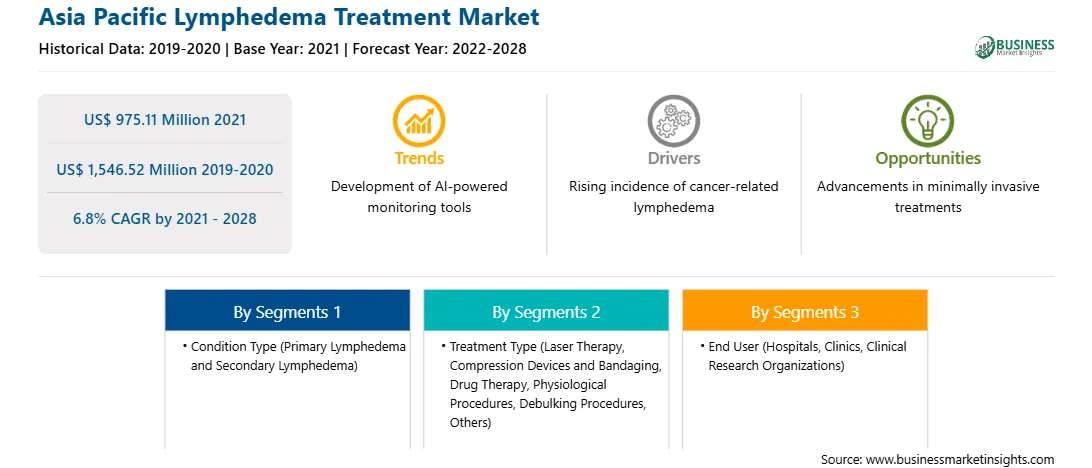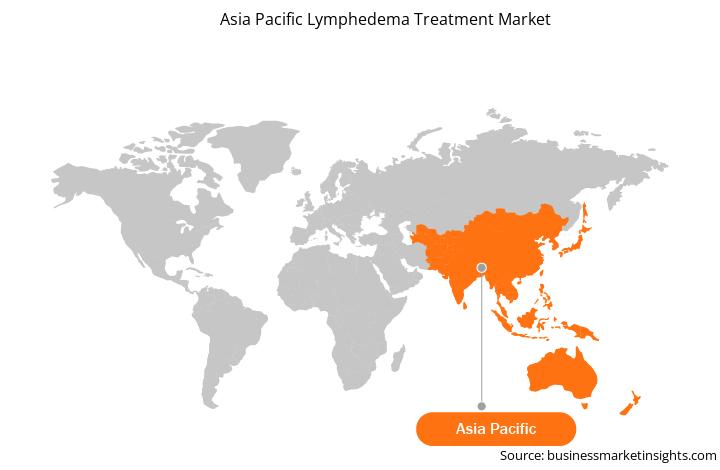Market Introduction
Asia Pacific (APAC) is the fastest-growing regional market for Lymphedema Treatment; and China, India, Japan, South Korea, Australia, and Rest of APAC are the major contributors to the market in this region. Asia Pacific is likely to account for over 11.96% market share of the lymphedema treatment market in 2021 owing to the growing investments from international players in China and India, improving government support in countries, expanding base of CRO services, and advancing healthcare infrastructure. Therefore, the region holds huge potential for the lymphedema treatment market players to grow during the forecast period. Rising treatment options is the major factor driving the growth of the APAC lymphedema treatment market.
The 2019 novel coronavirus (2019-nCoV), officially named COVID-19 by the WHO, has spread to more than 180 countries, including China prompting the WHO to declare the disease a global pandemic. The supply chain disturbances and the tremendous demand for efficient treatments for the therapy of COVID-19 have put the healthcare research industry in a crucial situation in the Asia Pacific region. Prohibitive measures have been taken to control the spread of this pandemic. COVID-19 pandemic has broadly affected those economies in the Asia Pacific region. Countries such as India, China, Japan, South Korea were adversely affected by the pandemic. The socioeconomics was severely affected, rising in negative inflation, GDPs, and a regional unemployment surge. The outbreak has severely affected the medical tourism industry in Asia pacific and imposed supply chain disruptions; moreover, low-income countries face additional challenges due to the shortage of healthcare infrastructure, restrictions imposed by hospitals to the suppliers, decreasing in demand for cardiovascular surgical instruments, and others. There are various research studies on the reduction of surgeries in the Asia Pacific countries. Restrictive measures have been put forth in South Korea, Malaysia, Singapore, the Philippines, and India to prevent disease transmission. These restrictive measures impacted the supply chain and the availability of medical devices in these countries. It has affected disposable incomes and has also resulted in unemployment. Furthermore, business strategies such as acquisitions, mergers, and partnerships are adversely affected by the imposition of complete lockdown. However, increasing vaccination across the region and availability of government reimbursement policies for various diseases is expected to normalize the situation in the Asia Pacific region and will gradually increase the demand for lymphedema treatment.
Strategic insights for the Asia Pacific Lymphedema Treatment provides data-driven analysis of the industry landscape, including current trends, key players, and regional nuances. These insights offer actionable recommendations, enabling readers to differentiate themselves from competitors by identifying untapped segments or developing unique value propositions. Leveraging data analytics, these insights help industry players anticipate the market shifts, whether investors, manufacturers, or other stakeholders. A future-oriented perspective is essential, helping stakeholders anticipate market shifts and position themselves for long-term success in this dynamic region. Ultimately, effective strategic insights empower readers to make informed decisions that drive profitability and achieve their business objectives within the market. The geographic scope of the Asia Pacific Lymphedema Treatment refers to the specific areas in which a business operates and competes. Understanding local distinctions, such as diverse consumer preferences (e.g., demand for specific plug types or battery backup durations), varying economic conditions, and regulatory environments, is crucial for tailoring strategies to specific markets. Businesses can expand their reach by identifying underserved areas or adapting their offerings to meet local demands. A clear market focus allows for more effective resource allocation, targeted marketing campaigns, and better positioning against local competitors, ultimately driving growth in those targeted areas.Asia Pacific Lymphedema Treatment Strategic Insights

Asia Pacific Lymphedema Treatment Report Scope
Report Attribute
Details
Market size in 2021
US$ 975.11 Million
Market Size by 2028
US$ 1,546.52 Million
Global CAGR (2021 - 2028)
6.8%
Historical Data
2019-2020
Forecast period
2022-2028
Segments Covered
By Condition Type
By Treatment Type
By End User
Regions and Countries Covered
Asia-Pacific
Market leaders and key company profiles
Asia Pacific Lymphedema Treatment Regional Insights

Market Overview and Dynamics
The lymphedema treatment market in APAC is expected to grow from US$ 975.11 million in 2021 to US$ 1,546.52 million by 2028; it is estimated to grow at a CAGR of 6.8% from 2021 to 2028. According to the Cleveland Clinic report, lymphedema can develop when there is damage to the lymphatic system or disruption in lymphatic damage. For example, lymph fluids drain into soft tissues, causing swelling and can occur anywhere in the body, with most cases occurring in arms and legs. Apart from that, cancer surgeries, radiation treatments, and other medical conditions raise the risk of lymphedema among patients. Additionally, among the gynecologic oncologic population, an increase in body mass index, insufficient levels of physical activity, and presence of pre-treatment lymphedema may be witnessed as potentially high-risk factors of lymphedema development. For example, oncological surgical procedures such as sentinel lymph nodes biopsy and radical dissection requiring excision of regional lymph nodes or vessels result in the development of secondary lymphedema. According to one report, lymphedema can occur after any cancer or its treatment affecting lymph node drainage. For example, it has been reported that it can occur within days and up to 30 years after the treatment for breast cancer. Also, 80% of patients experience onset within three years of surgery, and the remainder develops edema at a rate of 1% per year. Additionally, a large patient pool suffers from lower-limb lymphedema, particularly women after treatment for gynecological cancer, with the highest prevalence (36%) among vulvar cancer survivors and lowest prevalence (5%) among ovarian cancer survivors. Further, the overall incidence of arm lymphedema ranges from 8% to 56% at two years post-surgery. Furthermore, lymphedema may and do occur in the trunk, in addition to limbs. For example, radiation therapy to the chest wall is associated with the development of edema, particularly in the irradiated breast. Additionally, the healthcare system requires highly advanced treatment products. Therefore, major players are highly focusing on new and innovative product launches and approvals. Furthermore, with surging volume of lymphedema prevalence fuels the demand for lymphedema treatment ultimately contributing for the overall market growth.
Key Market Segments
The APAC lymphedema treatment market is segmented into condition type, treatment type, end-user and country. Based on type, the APAC lymphedema treatment market is segmented into primary lymphedema and secondary lymphedema. The secondary lymphedema segment dominated the market in 2020 and primary lymphedema is expected to be the fastest growing during the forecast period. Based on treatment type, the APAC lymphedema treatment market is segmented into laser therapy, compression devices and bandaging, drug therapy, physiological procedures, debulking procedures, and others. The compression devices and bandaging segment dominated the market in 2020 and debulking procedures segment is expected to be the fastest growing during the forecast period. Further physiological procedures segment is bifurcated into lymphovenous anastomosis (LVA) and vascularised lymph node transfer (VLNT).Based on end-user, the APAC lymphedema treatment market is segmented into hospitals, clinics, clinical research organizations, and others. The hospitals segment dominated the market in 2020 and clinics is expected to be the fastest growing during the forecast period.
Major Sources and Companies Listed
A few major primary and secondary sources referred to for preparing this report on lymphedema treatment market in APAC are company websites, annual reports, financial reports, national government documents, and statistical database, among others. Major companies listed in the report are 3M Company, BSN medical GmbH, Huntleigh Healthcare Limited, Lohmann & Rauscher GmbH & Co. KG, Mego Afek ltd, Sigvaris Group, and Smith & Nephew are among others.
Reasons to buy report
APAC Lymphedema Treatment Market Segmentation
APAC Lymphedema Treatment Market –By
Condition Type
APAC Lymphedema Treatment Market –By Treatment Type
APAC Lymphedema Treatment Market –By End-User
APAC Lymphedema Treatment Market -By Country
APAC Lymphedema Treatment Market -
Company Profiles
The Asia Pacific Lymphedema Treatment Market is valued at US$ 975.11 Million in 2021, it is projected to reach US$ 1,546.52 Million by 2028.
As per our report Asia Pacific Lymphedema Treatment Market, the market size is valued at US$ 975.11 Million in 2021, projecting it to reach US$ 1,546.52 Million by 2028. This translates to a CAGR of approximately 6.8% during the forecast period.
The Asia Pacific Lymphedema Treatment Market report typically cover these key segments-
The historic period, base year, and forecast period can vary slightly depending on the specific market research report. However, for the Asia Pacific Lymphedema Treatment Market report:
The Asia Pacific Lymphedema Treatment Market is populated by several key players, each contributing to its growth and innovation. Some of the major players include:
The Asia Pacific Lymphedema Treatment Market report is valuable for diverse stakeholders, including:
Essentially, anyone involved in or considering involvement in the Asia Pacific Lymphedema Treatment Market value chain can benefit from the information contained in a comprehensive market report.